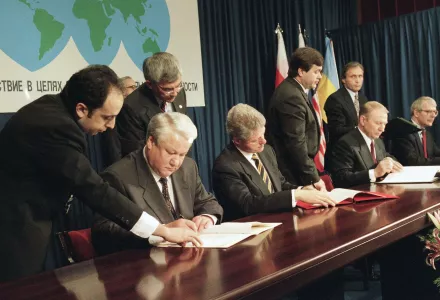In December 1994, the United States, the United Kingdom, and the Russian Federation pledged security assurances to Ukraine in connection with its accession to the Nuclear Nonproliferation Treaty as a non-nuclear-weapons state. The signature of the so-called Budapest Memorandum concluded arduous negotiations that resulted in Ukraine’s surrender of its nuclear arsenal, the world’s third-largest, which the country inherited from the collapsed Soviet Union. The signatories of the memorandum pledged to respect Ukraine’s territorial integrity and inviolability of its borders, and to refrain from the use or threat of military force. After Russia’s annexation of Crimea in 2014 and aggression in eastern Ukraine, the meaning and value of security commitments pledged to Ukraine in 1994 has become a contentious and hotly debated issue.
This one-day conference aims to revisit the history of the Budapest Memorandum; consider the repercussions of its violation for international security and the broader nonproliferation regime; and draw lessons for the future. The conference brings together academics, practitioners, and experts who have contributed to developing US policy toward post-Soviet nuclear disarmament, participated in the negotiations of the Budapest Memorandum, and dealt with the repercussions of its breach in 2014.
Speakers include:
Graham Allison, Harvard Kennedy School Applied History Project
Mariana Budjeryn, Research Fellow, Project on Managing the Atom
Matthew Bunn, Professor of Practice, Harvard Kennedy School
Ash Carter, Director, Harvard Kennedy School Belfer Center for Science & International Affairs
Rose Gottemoeller, former Deputy Secretary General of NATO
Thomas Graham, Former Acting Director of the Arms Control and Disarmament Agency
Susan Koch, former National Security Council and Department of Defense staff; Senior Fellow, National Defense University
Hennadiy Kovalenko, staff officer, NATO Supreme Allied Commander Transformation HQ
Steven Pifer, former US Ambassador to Ukraine; William J. Perry Fellow, Center for International Security and Cooperation, Stanford University
Mary Sarotte, Marie-Josée and Henry R. Kravis Distinguished Professor of Historical Studies, Johns Hopkins University
Yuriy Sergeyev, former ambassador of Ukraine to the UN; Senior Fellow, Yale University
Ihor Smeshko, former military attaché, Embassy of Ukraine in Washington, D.C. (via video link)
Nikolai Sokov, former staffer of the Ministry of Foreign Affairs of USSR and Russia; Senior Fellow, James Martin Center for Nonproliferation Studies
Borys Tarasyuk, former Minister of Foreign Affairs of Ukraine
James Timbie, Annenberg Distinguished Visiting Fellow, Hoover Institution
William H. Tobey, Senior Fellow, Belfer Center for Science & International Affairs




